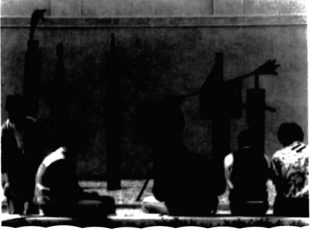4.3: The Cardinal Numerals from 0 to 1,000,000
- Page ID
- 142303
The Cardinal Numerals from 0 to 1,000,000
We have provided a complete table of the cardinal numerals in the Reference Grammar, 2.3.1, because you will need to recognize numbers of all kinds and, depending on your instructor and program, produce some of the spellings in exams or compositions. However, we give little attention in the text to spelling rules, and emphasize instead lots of exercises that require you to comprehend, and produce orally, common types of numbers (prices, telephone numbers, dates).
Exercice IV
Prepare to respond to the question Quel est votre numéro de téléphone? by reviewing the numerals above and by listening to the cassette for this chapter, exercise K. Your instructor will write telephone numbers on the board (or, for example, hand out slips of paper) and you should answer, following this model:
—Quel est votre numéro de téléphone?
—C'est le 44-63-01-12. (quarante-quatre, soixante-trois, zéro un, douze)
Exercice V
Your instructor will ask you for various dates and you should respond according to the model, with the proper date, of course. For most of the questions, we'll just expect the day and month, not the year.
—Quelle est la date aujourd'hui?
—C'est aujourd'hui le 30 septembre 1988. (le trente septembre, dix-neuf cent quatre-vingt-huit)
—Quelle est la date de votre naissance?
—C'est le 24 juin, (le vingt-quatre juin)
Lecture
As noted in the Intégration, from now on there will be a reading passage in each chapter. As we explained earlier, you should always start preparing a reading assignment well in advance of the day it is to be considered in class. Don't let its place at the end make you think it is an afterthought.
There's probably more variation in how instructors work with reading passages than with any other aspect of elementary or intermediate courses, but—no matter how much stress is placed on discussion of the reading in class—remember that it is vital to devote plenty of time to reading at home. The results will not necessarily be obvious to you at first, but over the long haul, you'll find it was time well spent.
This passage in dialogue form, from Jacques Prévert's Paroles, is comparatively simple.
L'Accent Grave
| LE PROFESSEUR | Élève Hamlet! |
| L'ÉLEVE HAMLET | (sursautant)...Hein...Quoi...Pardon...Qu'est-ce qui se passe ...Qu'est-ce qu'il y a...Qu'est-ce que c'est?... |
| LE PROFESSEUR | (mécontent) Vous ne pouvez pas répondre "présent" comme tout le monde? Pas possible, vous êtes encore dans les nuages. |
| L'ÉLEVE HAMLET | Etre ou ne pas être dans les nuages! |
| LE PROFESSEUR | Suffit. Pas tant de manières. Et conjuguez-moi le verbe être, comme tout le monde, c'est tout ce que je vous demande. |
| L'ELEVE HAMLET | To be... |
| LE PROFESSEUR | En français, s'il vous plaît, comme tout le monde. |
| L'ELEVE HAMLET | Bien, monsieur. (il conjugue) Je suis ou je ne suis pas Tu es ou tu n'es pas Il est ou il n'est pas Nous sommes ou nous ne sommes pas... |
| LE PROFESSEUR | (excessivement mecontent) Mais c'est vous qui n'y êtes pas, mon pauvre ami! |
| L'ELEVE HAMLET | C'est exact, monsieur le professeur. Je suis "où" je ne suis pas Et dans le fond, hein, à la réflexion. Etre "où" ne pas être C'est peut-être aussi la question. |

Common and Uncommon Knowledge
You have perhaps noticed your instructor's surprise in this class or another at some students' lack of information about geography, history, politics, or other aspects of our civilization that the instructor felt "everyone should know." In each chapter we're going to include a short set of questions about France that we'd like you to study (if you don't have that "common knowledge" already) in preparation for use of that information in class (in a dictation, an aural comprehension, a class discussion, or some other situation in which the instructor may find it appropriate to mention these details). At first we'll use some English, later French. Get in the habit of using French reference tools, if possible, when you check facts or spellings. For the next few chapters, all you'll need is a good map of France, access to a Petit Larousse, and a weekly magazine like Time or Newsweek.
- Write the names of four rivers (fleuves, rivières) in France, or on the borders of France. Use the definite article, for example, La Seine. (Now, of course, you can't use the name of the river that flows through Paris!)
- Name all the countries that border on France. Again, include definite articles.
- Name three mountain ranges in (or partially in) France.
- Who is the current president of France?

